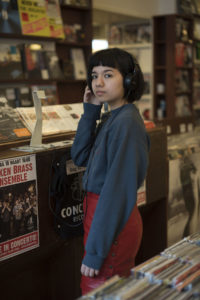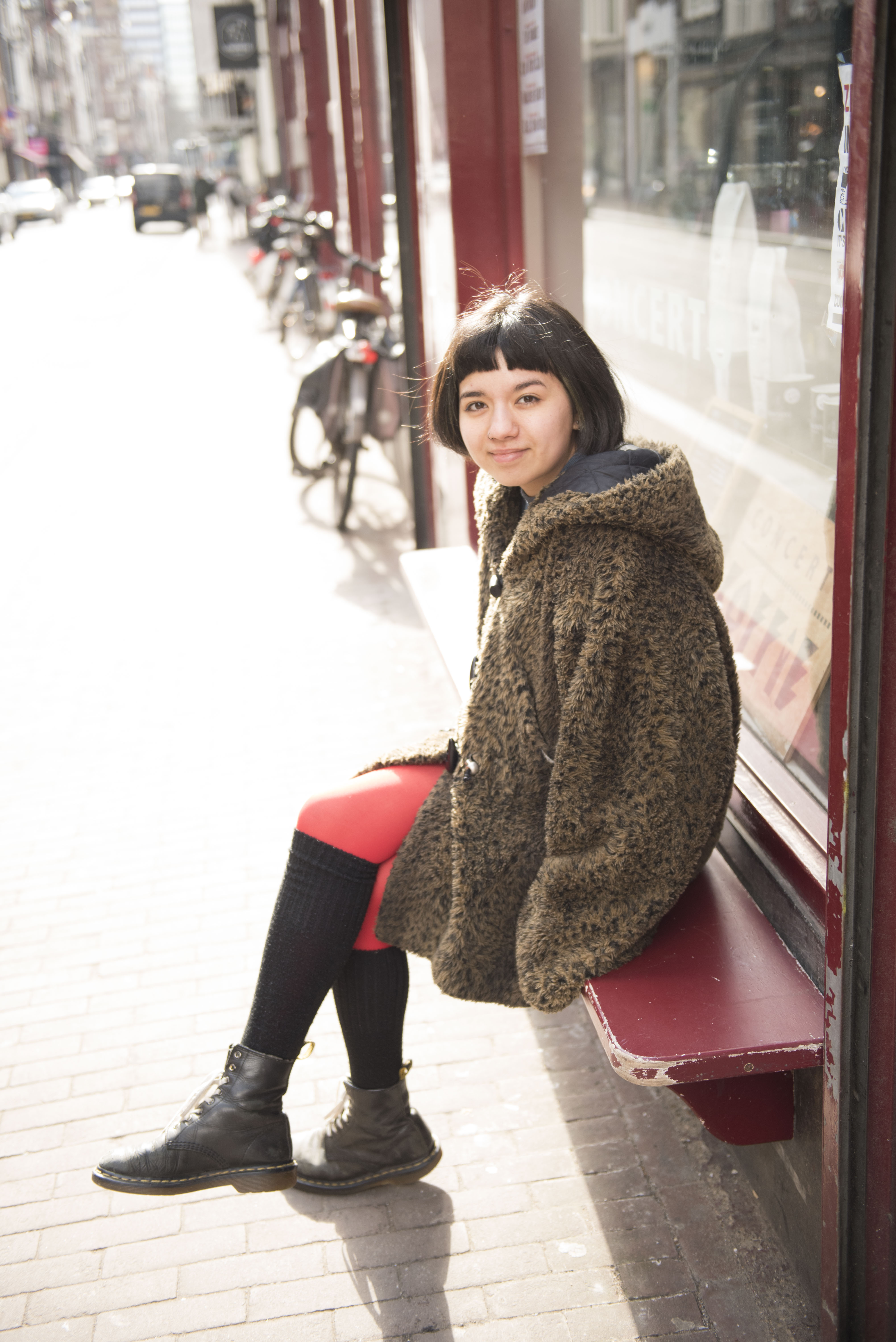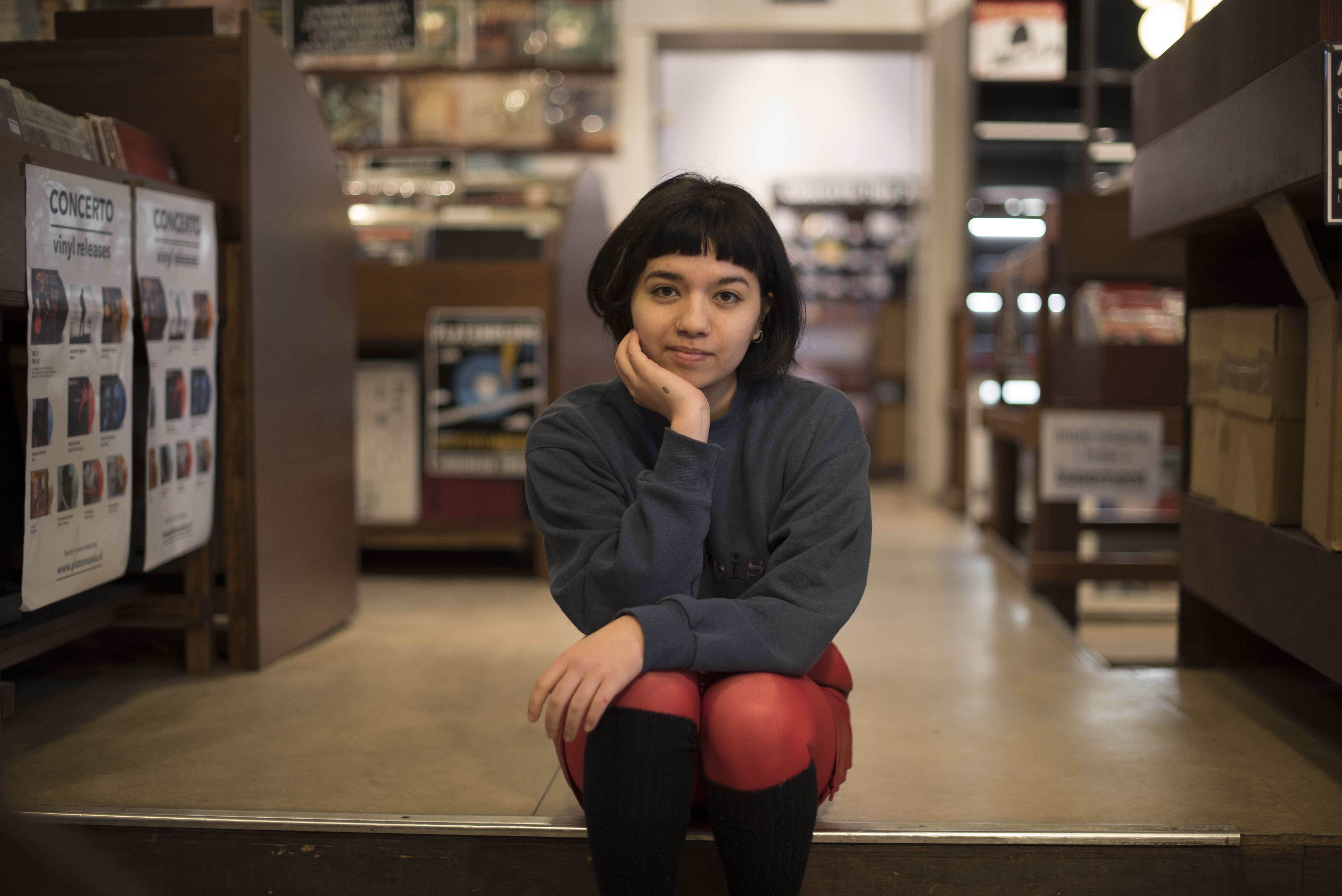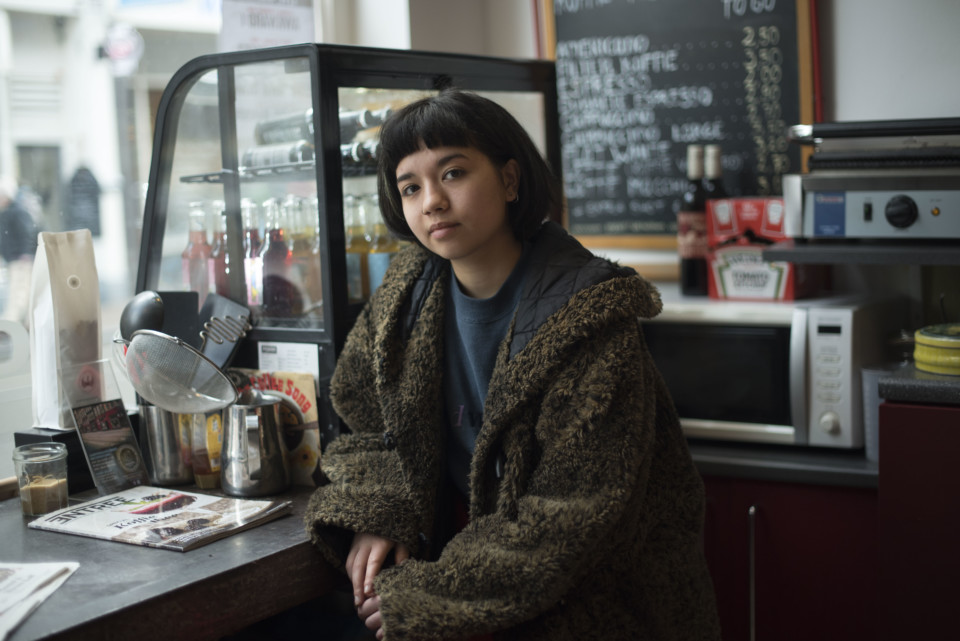W I N N I E
Amsterdam | 2018

W I N N I E
City — Amsterdam
Age — 23
Love life — Boyfriend
Profession — Student Cultural Heritage & barista at Concerto Record Store
Years in Amsterdam — 5
Location — Record Store Concerto
T H E A M S T E R D A M S T O R I E S
‘AMSTERDAM
HAS MADE
ME STRONGER’

- What makes you really happy?
“Music. It helps me to express my feelings; I send songs to friends to thank or support them. I’m so lucky to work in a record store, because I get to be around music all day. I’m a musician myself, I’ve played the guitar since I was twelve years old. I’m part of an indie punk band called The Klittens, that’s good fun.
Living in The Netherlands makes me happy as well. We have a lot of possibilities and opportunities here, we’re quite privileged. Education is accessible to almost everyone. Another reason I feel lucky that I was born here is because I have a chronical illness, Colitis Ulcerosa, which results in inflammation and ulcers of the colon. Sometimes it can take a full month before I feel better again. I get a lot of support from school and the government to help me finish my studies without any difficulties.”
- What is your best personality trait?
“People often tell me that I’m very honest and that it makes me tough. Since I am small in stature, it can be difficult to take a power stance and just tell it like it is. I’m not afraid to tell my professors if I disagree with them; I’ve heard that one fears me for it. Haha, I like that! Perhaps being so straightforward makes me a typical Dutchwoman. Although I don’t feel very Dutch, probably because I am Indisch (people in The Netherlands call themselves ‘Indisch’ when their ancestors were born in the former Dutch colony of Indonesia, and were either of Dutch or mixed Dutch-Indonesian descent). I would rather say I am Dutch-Indisch than Dutch. My grandparents arrived here in the fifties and my parents were born here. There is this culture of Indisch people in The Netherlands who feel very connected to each other. It’s in the food we eat and certain words we use. I even call the people at the Indisch take-out shop family, because they feel like that. I think my grandparents unconsciously brought those Indisch manners and warmth with them.”
- When do you feel different than other people?
“Overall, I don’t feel that different from others, but sometimes minor racist incidents happen that make me realise that I am different because I am not white. For example, when I walked in the city centre, a man in a car pulled up next to me, rolled down his window, yelled ‘KONNICHIWA!’ (a Japanese greeting) and drove on. I was baffled, it was so stupid. Another time a security guy at a festival said to me, ‘mmm, I like Thai!’. It’s quite painful, but I try to laugh about it, because I don’t want to get angry about such stupid, banal comments. Those people don’t even know my roots. When I was a little kid it happened more often, kids would call me ‘poop-Chinese’ or something like that, but it didn’t bother me much, I thought they said it to everyone. I was too young to understand that they used this specific swear word because of my Asian looks.”

- What is your biggest struggle?
“If I have to mention something, I would say I am having difficulties accepting that I’m getting older. I’m 23, so I have nothing to fear at the moment. But some of my friends have serious jobs now, they’re working five days a week and are always tired. They want to rest during the weekend and don’t have time for fun anymore. It kind of frightens me. I have the feeling that people all end up having the same lives and that it starts from the day you are born. I am scared that as soon as I start a career, I’ll become like everyone else and don’t have time for things like self-development anymore. I’m fighting this, I don’t want to conform. It is the fear of the middle-class life. I can’t imagine ever being ready for that kind of life, I’m too busy enjoying the freedom I have right now.” - What is your biggest life lesson?
“To put myself first. Not that I want to be selfish, but in the sense that when people are poisonous, I’m not afraid of breaking ties when it’s better for me. I had a lot of friends with problems and I think it is good when people share things, I do the same. But sometimes it really becomes a burden and the friendship becomes unbalanced. I do my best to explain why I kind of ‘broke up’ with them, so that they understand. But even if they don’t, it’s still important to put yourself first. I think I started to realise this because of my chronical illness. At school I immediately put my cards on the table and I ended up with an extra study grant. At first I thought, isn’t that selfish? But you’re only hurting yourself when you don’t go for what you need.” - What is your biggest sadness?
“Donald Trump. I’m sad that he became the president of one of the most powerful countries in the world. When I think about climate change, I’m scared about what the world will look like in twenty or thirty years. It’s something that really occupies my mind. I believe that as an individual you can do a lot to help reduce climate change. I don’t eat meat and I try to produce as little waste as possible. A lot of people are worried about that, but don’t take any action to change it. I think they believe their individual actions don’t matter. Or they see and understand the problem, but don’t really feel it. That makes me sad.”
- What is your biggest fear?
“Sometimes I’m scared that I will see the end of the world. Maybe it sounds exaggerated, but I am really afraid of this. It’s not so much that I’m afraid of dying, that’s part of life, but it does make me wonder why we are here at all. Why do I have to live exactly during the times of Trump and climate change? When I look at the world, I don’t think we are doing so well. It feels like we are at the beginning of the end.” - What makes you insecure?
“It’s kind of funny that I’m part of Women of Europe, because I feel insecure about being a woman. I know I am a woman, but I don’t immediately associate myself with the concept. What does it mean to be a woman? The word ‘woman’ signals a certain maturity that I don’t feel yet, but I also don’t feel like a girl anymore. Will I ever say, that night I became an adult? Maybe I’m in the middle of the transition from girl to woman now. It also makes me wonder what ‘typical female characteristics’ are. I think a lot of those ‘feminine’ traits are made up by the patriarchate.” - What is your biggest dream or ultimate goal?
“I don’t like to set goals, I’m more of a short-term thinker. Maybe that’s my life goal, to not set too big of a goal, but to just go with the flow and find my happiness in that. I do understand that not everyone has the chance to think like that.” - What does Amsterdam mean to you?
“It’s an adventure. It took a while to call Amsterdam my home and find a group I feel I belong to. The city once felt gigantic. Now I realise Amsterdam isn’t that big at all. All those different areas are like little villages where people know each other. The city centre used to feel overwhelming with all the tourists, but these days I can feel peace and quietude when I walk home along the canals. Plus, I know where the best ‘locals only’ spots are. I think Amsterdam has made me stronger. Studying in the East of the country was easy, within a month I had made friends who felt like family. Leaving those friends behind to move to Amsterdam was a big step. In the beginning I missed the safety and stability of that group, but I became stronger on my own. Born and raised Amsterdammers are friendly, curious, open and easy to talk to, but they kind of stick with their own people. It is unusual for them to spontaneously invite you over for dinner. I’ve made new friends, but I’ve also learned to be comfortable with just me. I love sitting in my room by myself, making music. I don’t need to be surrounded by people constantly anymore.”
Photos by Mabel van den Top

